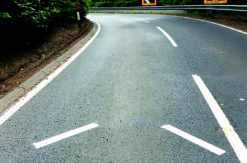
There is a genuine desire among motorcycling stakeholders to ensure their industry plays a significant role in the future transport mix.
In the last few weeks, two of the industry’s key players have both published separate policy documents, outlining the steps they want to see taken to protect motorcycling as the UK works towards its Vision Zero and Net Zero targets.
Let’s be frank, the idea of motorcyclists feeling forgotten or overlooked when it comes to transport policy is nothing new – perhaps with some justification.
Only last month, concerns were raised about the changes to The Highway Code – and how little input had been received from motorcyclists, despite the fact they are among the most vulnerable road users.
If you trawl back through the archives to June 2020, there was heavy criticism of the Government for failing to recognise motorcycling as an alternative to public transport during the Covid-19 pandemic.
The National Motorcyclists Council (NMC) launched its strategy at an event hosted by the All Party Parliamentary Motorcycle Group, at Westminster on 1 March.
Titled ‘Motorcycling and the Future of Transport Policy’, the strategy sets out ‘in a clear concise format’ the policies that will work to the nation’s benefit, addressing mobility, the environment, safety and accessibility.
It is supported by the NMC’s members, who include IAM RoadSmart, the British Motorcyclists Federation and The National Motorcycle Dealers Association.
Missing from the list of supporters, however, is the Motorcycle Action Group (MAG), who announced on 22 February – a week prior to the publication’s launch date – that it has withdrawn its membership from the NMC.
In a press release, MAG says it is “more than capable of communicating with Government without a third-party interlocutor”.
Instead, MAG has set up a new forum, which will be known as UK Motorcycling (UKM).
The objective for this new discussion forum is to ‘create a collaborative meeting environment where all stakeholders can share views and opinions on what will be a challenging few years ahead for Motorcycling in the UK’.
MAG has also thrown its support behind a second policy document, published by the Motorcycle Industry Association (MCIA) on 23 February, titled ‘Journey to a Brighter Destination’.
The MCIA strategy puts forward a ‘compelling case’ for why motorcycling must be protected as much as possible as the Government heads towards a net zero future – focussing on the ‘significant environmental, economic, and societal benefits to the UK’s transport population’.
Having read both documents, it is clear they agree on the key issues. Both call for reforms when it comes to the ‘unnecessarily onerous’ (MCIA) current training and testing regime – and want to see more Government support for post-test training initiatives.
There is also agreement that ‘far more should be done’ to ensure drivers are aware of riders (MCIA) – with the NMC calling for the theory test to be changed to include questions covering all modes of transport, and for the hazard perception test to include ‘a wider variety of scenarios’.
When it comes to decarbonisation, both want motorcycle groups to have a voice on decarbonisation ‘timetables, process and legacy protections’ (NMC).
They call for low-polluting current motorcycle types to be encouraged, given their ‘limited impact on the environment’ (MCIA) – and agree that reductions in emissions ‘can be achieved right now by a modal shift to motorcycling’ (NMC).
Of course, both documents go into far more detail – and cover a whole plethora of issues. Both reports are available to read via the following links:
08 March 2022


